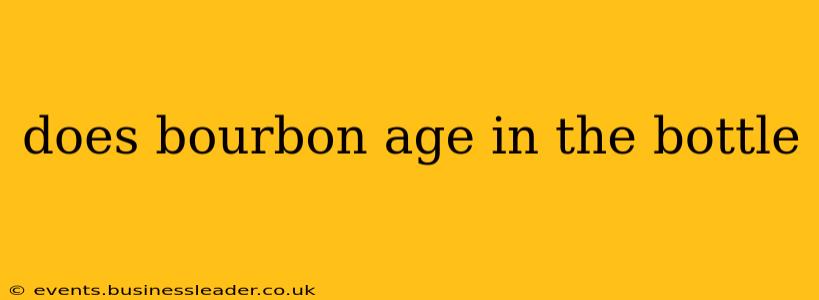Does Bourbon Age in the Bottle? The Definitive Answer
The short answer is no, bourbon does not age in the bottle. The aging process, crucial to developing bourbon's complex flavor profile, occurs exclusively in new, charred oak barrels. Once the bourbon is bottled, the aging process effectively stops. This is a fundamental aspect of bourbon production and understanding this distinction is key to appreciating the spirit.
Let's delve deeper into this topic, addressing some common questions and misconceptions:
What Happens to Bourbon After Bottling?
After the bourbon master distiller determines the spirit has reached its optimal age in the barrel, it's bottled. While some subtle changes might occur in the bottle due to oxidation, these are minimal and vastly different from the significant transformations that happen during barrel aging. The interaction with the wood of the barrel is what truly shapes the bourbon's character. No further interaction with oak occurs once bottled, resulting in no further aging.
Why Doesn't Bourbon Age in the Bottle?
The aging process in the barrel is a complex interplay of several factors:
-
Interaction with the Oak: The porous nature of new, charred oak barrels allows for a slow exchange between the bourbon and the wood. This interaction leaches desirable compounds like vanillin (vanilla), tannins (bitterness and structure), and ellagitannins (complexity) from the wood into the bourbon. This is impossible once bottled.
-
Oxygen Exposure: While a small amount of oxygen enters the barrel through the wood's pores, it's a controlled and slow process. This controlled oxidation contributes to the maturation. Bottled bourbon's exposure to oxygen is drastically different, often leading to faster oxidation, which can negatively impact the taste, potentially leading to a harsh, less desirable flavor.
-
Evaporation ("The Angel's Share"): A significant portion of the bourbon evaporates during barrel aging (the "angel's share"). This evaporation concentrates the remaining liquid, further enhancing the flavors. This doesn't occur in the bottle.
What are the Changes That Do Occur in the Bottle?
While bourbon doesn't age in the bottle, there are some subtle changes that can occur:
-
Oxidation: A limited amount of oxidation can occur due to exposure to air in the bottle. This can lead to slight changes in aroma and taste, but usually these are less pronounced and less beneficial than the transformations that occur in the barrel.
-
Sedimentation: Over time, some sediment may form at the bottom of the bottle. This is natural and often indicates the bourbon's age and lack of filtration.
Does Storing Bourbon in Different Conditions Affect It?
Yes, storing bourbon improperly can affect its flavor negatively. Factors like temperature fluctuations and exposure to direct sunlight can accelerate oxidation and potentially diminish quality. Proper storage in a cool, dark place is recommended to preserve the bourbon's flavor.
Can I Age Bourbon Myself After Bottling?
No, attempting to age bourbon after bottling will not yield the same results as barrel aging. The essential interaction with the charred oak barrels is impossible to replicate at home. Any changes occurring will likely be negative, rather than improving the flavor.
In conclusion, while minimal changes can occur in bottled bourbon, the aging process itself ceases upon bottling. The magic happens in the barrel, where the bourbon interacts with the wood, oxygen, and time, to produce the complex and nuanced flavors we associate with fine bourbon.
